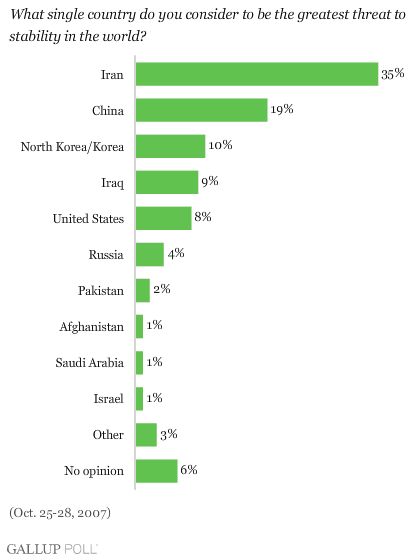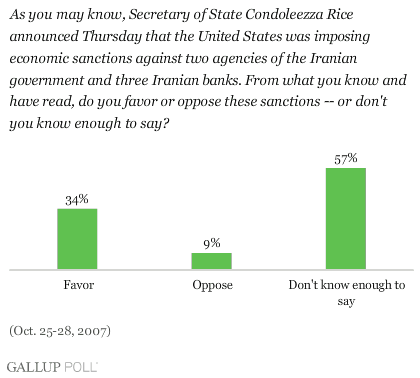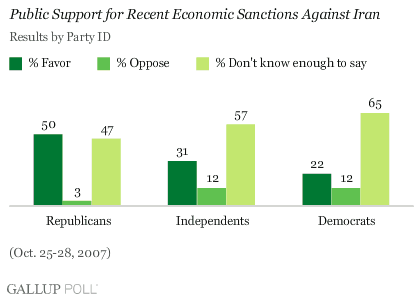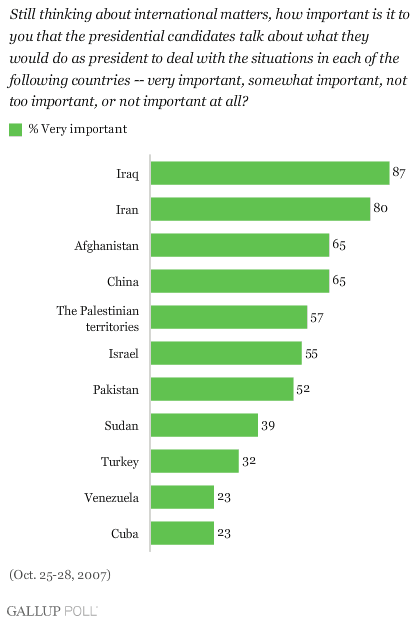PRINCETON, NJ -- Iran is the single country that by far poses the greatest threat to stability in the world, according to the views of the American public in a recent Gallup Panel poll. At the same time, while more Americans support rather than oppose the U.S. government's new sanctions against Iran, the solid majority does not know enough about the sanctions to have an opinion. Republicans are much more likely than independents or Democrats to view Iran as a global threat, and also more likely to endorse the sanctions.
Asked how important it is that the presidential candidates talk about what they would do as president to deal with the situations in various countries around the world, Americans are most likely to say it’s very important that candidates talk about Iraq and then Iran, followed by Afghanistan and China. Republicans rate Iran and Iraq equally as countries that are very important for the candidates to be discussing, while among Democrats and independents, Iraq stands alone.
Greatest Threat to World Stability?
The Oct. 25-28, 2007, survey asked Americans to name, without prompting, the single country that they consider to be the greatest threat to stability in the world. Iran tops the list, with 35% of Americans saying it is the greatest threat to world stability. China is next, mentioned by 19%, followed by North Korea, Iraq, the United States, and Russia.

Republicans, independents, and Democrats all are more likely to mention Iran than any other country as the greatest threat to world stability, but there are big differences by party. Republicans are much more likely than either Democrats or independents to mention Iran.
|
Country That Is Greatest Threat to World Stability
|
|||
|
|
Republicans |
Independents |
Democrats |
|
|
% |
% |
% |
|
Iran |
50 |
30 |
26 |
|
China |
18 |
16 |
22 |
|
North Korea/Korea |
8 |
15 |
8 |
|
Iraq |
9 |
6 |
12 |
|
United States |
1 |
12 |
11 |
|
Russia |
4 |
4 |
5 |
|
Pakistan |
1 |
3 |
3 |
|
Afghanistan |
1 |
1 |
2 |
|
Saudi Arabia |
1 |
* |
3 |
|
Israel |
1 |
1 |
* |
|
|
|
|
|
|
Other |
2 |
3 |
3 |
|
No opinion |
5 |
9 |
5 |
|
* Less than 0.5% |
|||
While Republicans view Iran as the dominant threat by a wide margin, Democrats are nearly as likely to mention China as Iran. Another major difference is that a substantial percentage of Democrats and independents mention the United States as the greatest threat, something few Republicans do.
Public Support for Recent Economic Sanctions Against Iran
Last Thursday, Secretary of State Condoleezza Rice announced that the United States was imposing economic sanctions against key Iranian military and financial institutions. More Americans support (34%) rather than oppose (9%) these sanctions, but the solid majority of Americans, 57%, are not familiar enough with them to have an opinion.

Half of Republicans support the recent sanctions against Iran, while 3% oppose them and 47% do not have an opinion. Democrats are also more likely to support (22%) than oppose (12%) these sanctions, but nearly two in three Democrats do not offer an opinion. Independents' views of the sanctions closely mirror those of the general public.

The poll also asked Americans whether it is very important, somewhat important, not too important, or not important at all that the presidential candidates talk about what they would do as president to deal with the situations in 11 different countries around the world. Americans put talking about Iraq and Iran at the top of the list.

An overwhelming 87% of Americans say it is "very important" that the candidates talk about their plans to deal with the situation in Iraq, and 80% say the same about the situation in Iran. Next are Afghanistan, China, the Palestinian territories, Israel, and Pakistan, each mentioned as very important by over half of Americans. The public expresses far less interest in hearing the candidates' plans for the situations in Sudan, Turkey, Venezuela, and Cuba.
Republicans, independents, and Democrats differ in the importance they ascribe to candidate discussions of the various countries.
|
Percentage Saying It Is "Very" Important That the Presidential Candidates
|
|||
|
|
Republicans |
Independents |
Democrats |
|
|
% |
% |
% |
|
Iraq |
88 |
84 |
90 |
|
Iran |
87 |
74 |
80 |
|
Afghanistan |
69 |
58 |
70 |
|
China |
67 |
63 |
66 |
|
Israel |
63 |
50 |
52 |
|
The Palestinian territories |
61 |
51 |
59 |
|
Pakistan |
56 |
44 |
56 |
|
Turkey |
35 |
29 |
34 |
|
Venezuela |
31 |
18 |
20 |
|
Sudan |
31 |
38 |
49 |
|
Cuba |
22 |
21 |
25 |
Overall, Republicans are equally likely to say it is very important that the candidates spell out their stances on Iraq and Iran, while Iraq rates as significantly higher than Iran among Democrats and independents.
In addition to the partisan differences in ratings of Iran and Iraq, the poll also finds the following:
- Republicans are more likely than Democrats or independents to say it is very important for the candidates to talk about their plans to deal with Venezuela, Israel, and Iran.
- Democrats are much more likely than independents or Republicans to say it is very important that the candidates discuss their plans to deal with the situation in Sudan.
- Independents are less inclined than Republicans or Democrats to say it is very important that the candidates talk about their plans to deal with Iran, Afghanistan, the Palestinian territories, Pakistan, and Turkey.
Survey Methods
Results for this panel study are based on telephone interviews with 1,000 national adults, aged 18 and older, conducted Oct. 25-28, 2007. Respondents were drawn from Gallup's household panel, which was originally recruited through random selection methods. The final sample is weighted so it is representative of U.S. adults nationwide. For results based on the total sample of national adults, one can say with 95% confidence that the margin of sampling error is ±4 percentage points.
For results based on the sample of 310 Republicans, the maximum margin of sampling error is ±7 percentage points.
For results based on the sample of 348 independents, the maximum margin of sampling error is ±6 percentage points.
For results based on the sample of 342 Democrats, the maximum margin of sampling error is ±6 percentage points.
In addition to sampling error, question wording and practical difficulties in conducting surveys can introduce error or bias into the findings of public opinion polls.
What single country do you consider to be the greatest threat to stability in the world? [OPEN-ENDED]
|
|
2007 Oct 25-28 |
|
|
% |
|
Iran |
35 |
|
China |
19 |
|
North Korea/Korea |
10 |
|
Iraq |
9 |
|
United States |
8 |
|
Russia |
4 |
|
Pakistan |
2 |
|
Afghanistan |
1 |
|
Saudi Arabia |
1 |
|
Israel |
1 |
|
|
|
|
Other |
3 |
|
No opinion |
6 |
Still thinking about international matters, how important is it to you that the presidential candidates talk about what they would do as president to deal with the situations in each of the following countries -- very important, somewhat important, not too important, or not important at all? How about -- [RANDOM ORDER]?
|
2007 Oct 25-28
|
|
Somewhat
|
|
Not important
|
|
|
|
% |
% |
% |
% |
% |
|
Iraq |
87 |
9 |
2 |
2 |
* |
|
Iran |
80 |
16 |
3 |
2 |
* |
|
Afghanistan |
65 |
28 |
5 |
2 |
* |
|
China |
65 |
26 |
6 |
3 |
* |
|
Pakistan |
52 |
39 |
7 |
2 |
1 |
|
The Palestinian territories |
57 |
32 |
8 |
3 |
1 |
|
Israel |
55 |
33 |
8 |
4 |
* |
|
Sudan |
39 |
41 |
14 |
4 |
1 |
|
Turkey |
32 |
46 |
14 |
6 |
1 |
|
Venezuela |
23 |
43 |
23 |
9 |
1 |
|
Cuba |
23 |
41 |
24 |
12 |
* |
|
* Less than 0.5% |
|||||
As you may know, Secretary of State Condoleezza Rice announced Thursday that the United States was imposing economic sanctions against two agencies of the Iranian government and three Iranian banks. From what you know and have read, do you favor or oppose these sanctions -- or don't you know enough to say?"
|
|
|
|
Don't know enough to say |
|
|
2007 Oct 25-28 |
34% |
9 |
57 |
* |
|
* Less than 0.5% |
||||
